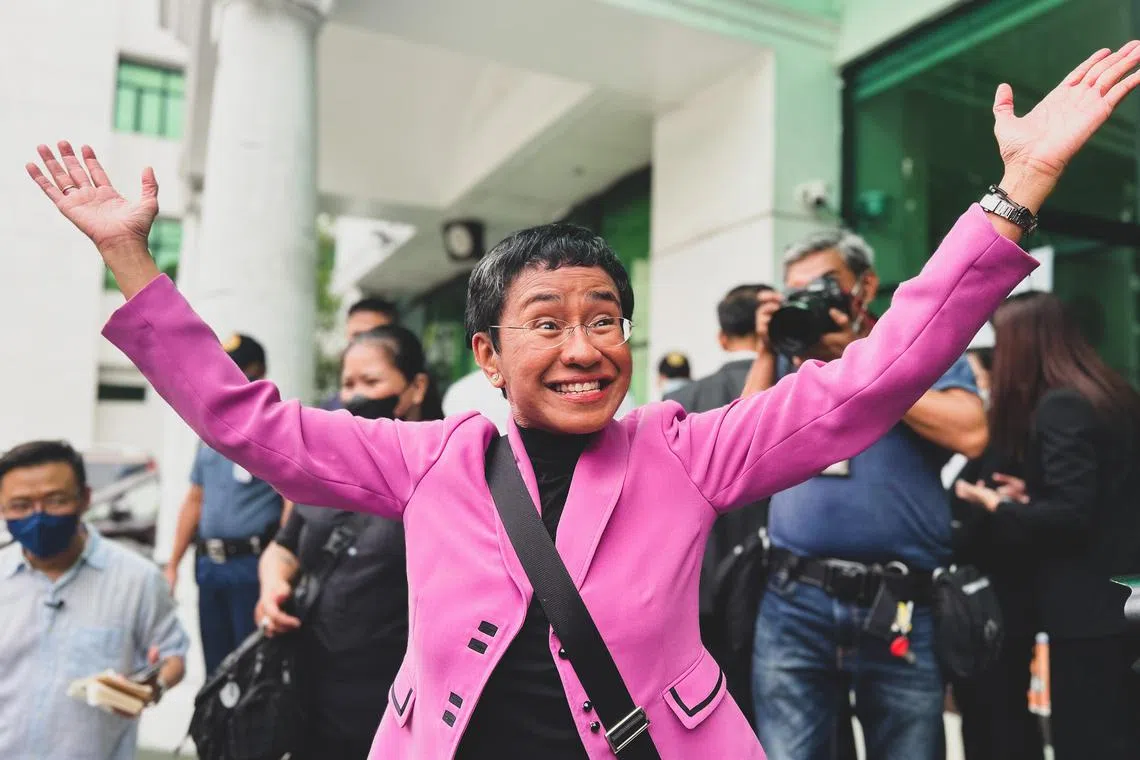Philippines’ Nobel laureate Maria Ressa, Rappler acquitted of tax evasion charges
Sign up now: Get ST's newsletters delivered to your inbox

This is a high-profile court win for Rappler and its co-founder and CEO Maria Ressa.
PHOTO: THE STRAITS TIMES
Follow topic:
MANILA – The Philippines’ embattled Nobel Peace Prize recipient Maria Ressa on Wednesday scored a legal victory after the country’s tax court acquitted her and her news organisation Rappler Holdings Corporation of four tax evasion charges, ending years of trial for cases she said were politically motivated.
The Court of Tax Appeals (CTA) on Wednesday dismissed the tax violation cases filed against the accused in March 2018 by the Department of Justice (DOJ) under former president Rodrigo Duterte.
Ms Ressa would have faced 34 years in jail if convicted. “Today, facts win, truth wins, justice wins,” she said, fighting back tears as she faced the media minutes after her acquittal.
“These charges, as you know, were politically motivated, a brazen abuse of power, and meant to stop journalists from doing their jobs. These cases are where capital markets, where rule of law, where press freedom meet, right? So this acquittal, even if it took a while to be resolved, is not just for Rappler; it is for every Filipino who has ever been unjustly accused,” she added, her voice breaking.
She said the acquittal was a “ray of hope” for other Filipinos who were unjustly jailed under the previous Duterte regime, citing human rights icon and former senator Leila De Lima and community journalist Frenchie Mae Cumpio.
Ms De Lima was arrested in 2017 over what she has described as the Duterte government’s trumped-up drug charges against her, while Ms Cumpio, a journalist who often covered police and military abuses in central Philippines, was jailed in 2020 due to alleged illegal firearms possession and terrorism financing.
In the now-dismissed tax cases, the DOJ had argued that Rappler’s issuance of Philippine Depositary Receipts (PDRs) to foreign investors Omidyar Network and North Base Media generated taxable income worth 141.86 million pesos (S$3.42 million) that the digital media company did not declare in 2015. A month before the DOJ filed the tax cases, Omidyar had already donated its PDRs to 14 Rappler managers.
A PDR is a financial instrument that allows foreigners to invest in a Philippine company without owning any part of it or being involved in day-to-day management.
But Ms Ressa and Rappler denied the charges, saying the PDR transactions were meant to raise capital. They argued that PDRs are legitimate financial mechanisms that do not generate taxable income.
The CTA justices agreed with them.
The court said there was nothing in the wording of Rappler’s PDRs that showed foreign entities Omidyar and North Base Media would become owners of Rappler shares. It said this meant Rappler and Ms Ressa were “not required to pay income tax and value-added tax on the PDR transactions”.
“The plaintiff, therefore, failed to prove the guilt of the accused beyond reasonable doubt,” the CTA said.
This is a high-profile court win for Rappler and its co-founder and chief executive, Ms Ressa, who was earlier convicted for cyber libel over a 2012 story she did not write nor edit.
She and her co-accused Rey Santos Jr, a former Rappler researcher, plan to appeal against their cyber libel case conviction before the Philippines’ top court. Both are out on post-conviction bail.
The PDRs cited in the tax cases were also the reason the Philippines’ corporate watchdog revoked Rappler’s licence for allegedly violating the country’s anti-dummy law and constitutional restrictions on foreign ownership.
These cases remain pending, and Rappler can continue operations for now as the closure order against it is not final
Lawyer Francis Lim, one of Ms Ressa’s legal counsel, said the acquittal would help strengthen their appeal in these pending cases. “A contrary decision today would have negative implications, not only for the freedom of the press, but on the economy,” he said.
Rappler had published investigative reports on Mr Duterte, the former authoritarian leader who gained infamy from 2016 to 2022 for waging a bloody drug war and who is now the subject of a potential crimes against humanity probe by the International Criminal Court.
His government lodged multiple cases against Ms Ressa, Rappler and its reporters in retaliation, a move considered by watchdogs as part of the Duterte regime’s broader attack against press that was critical of him.
President Ferdinand Marcos Jr, Mr Duterte’s ally, has so far distanced himself from the cases hounding Rappler, saying it would be “improper” for him to interfere with the proceedings.
The only son and namesake of the late dictator has vowed to respect press freedom, but journalists critical of him during his presidential campaign in 2022 were reportedly harassed and shunned in favour of “friendlier” media and bloggers.
“I think my appeal is now to every Filipino, to every journalist, to every lawmaker: We need to work together to protect the democracy that will inevitably protect us,” said Ms Ressa.
The Philippines remains one of Asia’s most dangerous places for journalists. It was ranked 147th out of 180 countries in the 2022 World Press Freedom Index. It also placed seventh globally in the Committee to Protect Journalists’ 2021 impunity index, which tracks the deaths of media members whose killers go free.


